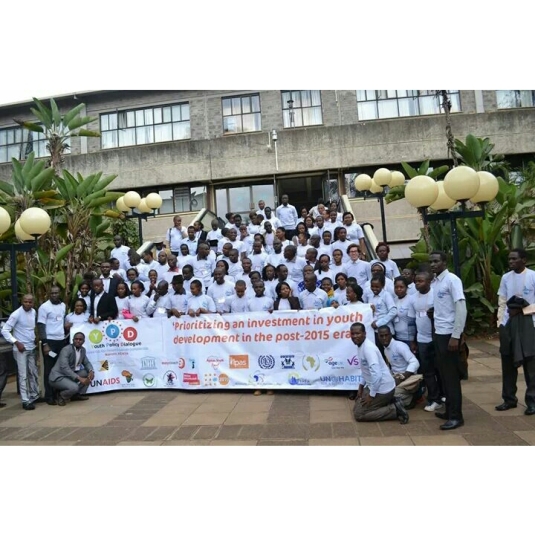“I wish we questioned the aid model as much as we are questioning the capitalism model. Sometimes the most generous thing you can do is just say no.”
(Photo courtesy of http://www.tdrp.net/SlidesShows/TDRP_UgandaSoccer.html)
John Opiyo is an energetic, vibrant young man who hails from Gulu, Northern Uganda. Another one of the very cool people I met at the High Level Youth Policy dialogue last week that was held at the UN offices in Nairobi. His energy when addressing human rights issues is magnetic and one cannot help but notice him in the room. I had the pleasure of joining John for lunch on one of the days and he gave me a little insight into his life. His words, when I asked how life was like in Gulu were, “I keep getting threatened,” as he chuckles and smiles. To say that he’d caught my attention is an understatement!
John tells me that this interesting phase in his life began when he decided to advocate for his community’s rights. Battling it out is more like it.
As most of us know, Northern Uganda is a region that had been plagued by internal war, terror, child kidnappings, displacement and poverty for the longest time. The atrocities are unmentionable. These are all rooted from the counter rebellions against Yoweri Museveni, led by Joseph Kony from the Lord’s Resistance Army. My mind wanders off to whether this is the source of the threats..
John continues to engage me in conversation and alerts me that the threats are not from any militia group but from an international NGO based in Gulu. The genesis of this is when John began interacting with the community on a personal level to which he uncovered astounding facts. He discovered that the NGO had been giving out aid money in exchange for money from the community. What he said did not make sense to me yet what is so disheartening is that it did to the community. Reason for this is that the community lives in such abject poverty that they do not know any better when it comes to receiving donor funding. The mandate of the NGO was to enhance development in the area however in the scheme of things, they had made the entity a money making machine. If this was not bad enough, the NGO created a false data system which recorded invisible children who were receiving substantial amounts of aid.
Which brings us to the threats; John states that on his own initiative he began educating the community on their basic human rights; what they should expect from the government and what they should expect from an NGO setting camp in their town. He has since sued this organization which has resulted in him receiving several ‘intention to sue’ letters on charges of defamation and libel. He reiterates that there is dire need for a legal system that supports anti corruption in his country.
What is worrisome is that the youth in this community have given up and see no point in challenging the state on meeting their needs, let alone challenge the NGO through the judicial system despite knowledge of their misdeeds. It is admirable to see that John has decided to take it upon himself to challenge these NGOs one at a time or all at once depending on how quick he uncovers evidence. This week he is in court challenging this particular NGO that he narrates about but highlights that there are couples more. The zeal that this young man has is remarkable!
I then ask him what he intends to do if the government fails to meet his needs and aspirations. It seems that this question jolted a nerve in him as he tells me that African youth need to wake up! The future rests with them yet they are very much asleep. There is a current shift at the global scale and there is fundamental rewriting of territories and states for example, the Arab spring. In Sub Saharan Africa, youth and majority of the population have remained poor and some governments, so as to remain relevant, have maintained the status quo. In the least developed communities, abject poverty has been a driving tool for garnering election campaign support. If the youth had access to information and understood their basic rights, then they would hold their governments accountable on all levels.
John and I agree that there is definitely need for a shift in the mindset of young people. It is estimated that by 2030, nearly one in four young people in the world will be African. This presents Africa with an enormous opportunity but it could also present a significant risk and substantial threat to social cohesion and political stability if youth do not understand this and if governments fail to create sustainable livelihoods for them.
I wish John the best with his court case and ask what he intends to do to have a lasting impact in his community in Gulu. His words, “educate one youth at a time.”
(Photo Courtesy of Joseph Opiyo Otiti)






Recent Comments